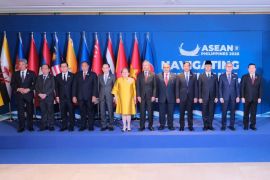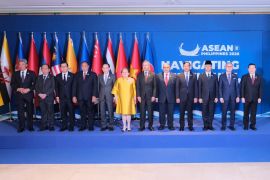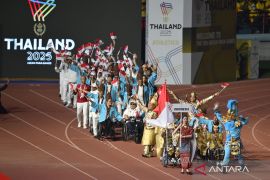Indian lecturer Baladas Ghoshal from Jamia Millia University referred to the matter in a lecture titled "Prospects of Cooperation and Convergence of the Issues and Dynamics in the South China Sea" here Tuesday.
Baladas said the dispute over the Spratly and Paracel islands now involved some ASEAN (Association of South East Asian Nations) member countries, namely Vietnam, Malaysia, the Philippines and Brunei.
"Indonesia is not a claimant to the dispute, but was actively involved for a long time in organizing confidence-building measures with the objective of diffusing tension and avoiding eruption of any major conflict in the region," he said.
The remaining members of ASEAN are not involved in any way with the dispute, but nevertheless are concerned about the South China Sea as a potential flashpoint in the Asia-Pacific region.
"ASEAN can choose to resolve its security dilemma vis-a-vis modernized confident and resurgent China. Such a strategy, however, will require ASEAN to play a constructive role in the relationship between the United States, Japan, India and China, the key powers that would determine the future of Asia-Pacific," he said.
Baladas said that it can be done only by maintaining a careful balance in its dealings with the key players that ASEAN can play a constructive role in regional diplomacy and create a space within which the member countries can pursue their economic and political developments in a climate of peace and stability.
ASEAN`s close relationship with India could be particularly stabilizing factor, above all, it is the ASEAN unity that will not only determine its future diplomatic profile, but also its ability to handle assertive China.
In fact, most ASEAN-China dialogues or interactions could be possible only on China`s terms which essentially because of ASEAN`s weakness vis-a-vis China, militarily and otherwise, he said.
"We would further argue that the current ASEAN approach towards China is too soft and weak," Baladas said.
Until now China has paid lip service to both these commitments. It had used both diplomacy and physical occupation to promote its goal in the South China.
"China is uncompromising on the issues it considers vital to its national interests. The Spratlys issue is one such vital interest," said Baladas.
The dispute between China and ASEAN erupted into the open after U.S. Secretary of State Hillary Clinton, in Hanoi for the annual meeting of the 27-nation ASEAN Regional Forum, offered American support for "a collaborative diplomatic process by all claimants for resolving the various territorial disputes without coercion."
In the aftermath, it became obvious that many countries, in and out of ASEAN, welcome such a United States role so as to balance China. Those who spoke on the issue involved not just the claimant countries but also Indonesia, Japan and Australia.
The assertion that Beijing`s dispute is only with some member countries rather than with ASEAN as a whole is difficult to reconcile with the record.
While claiming sovereignty over virtually all of the South China Sea, Beijing proposed postponing resolution of the dispute to instead discuss the joint development of undersea resources.
To ease regional concerns, China signed a standstill agreement a so-called Declaration on the Conduct of Parties in the South China Sea with a pledge to exercise restraint.
The effect of that had been to divert attention away from China`s continued effort to strengthen its military control over its possessions and expanding its de facto boundaries by barring its neighbours from fishing in disputed waters or drilling for oil in waters far away from China.
According to Baladas, in 2007 and 2008, it even stopped BP and Exxon Mobil from drilling in waters offshore Vietnam.
China also took its expansive claim to the South China Sea a notch higher by challenging (in 2009) a US Navy survey ship, the Impeccable, some 75 miles from the shore of China`s Hainan Island effectively extending its 12 nautical miles territorial waters to a 200-mile Exclusive Economic Zone (EEZ).
The US maintains that under the UN Law of the Sea, its naval vessels have the right of free passage through the EEZ. In March, China told senior US officials that its sovereignty over the South China Sea was undisputed and one of the core issues that brooked no compromise.
This growing Chinese assertiveness, coupled with the double-digit growth of its defence budget, has increasingly worried East Asia. Encouraged by the new-found interest shown by the Obama administration, countries in the region have quietly lobbied Washington to play a more active role in regional affairs.
ASEAN Approach to South China Dispute
After ASEAN made China as a dialogue partner in 1992, ASEAN issued a declaration of principles on the South China Sea in which the organization-not member countries-urged "all parties concerned" to exercise restraint to create "a positive climate for the eventual resolution of all disputes."
Ten years later, in 2002, China signed a document called the Declaration on the Conduct of Parties in the South China Sea with ASEAN as a whole and not only with countries with which it had unresolved territorial disputes.
Since then, ASEAN and China have been working on a "Regional Code of Conduct in the South China Sea," but agreement has been elusive.
"To claim now, after 19 years of dialogue, that ASEAN as a whole is not involved is to be disingenuous, if not worse," he said.
Moreover, China knows that the members of ASEAN have agreed that before countries with territorial disputes meet with China on the South China Sea disputes, all 10 member countries will meet first to hammer out a common position.
ASEAN members should know that individually they have little strength but, if they stay united, they can be a formidable political force.
The agreement signed between China and ASEAN in 2002 has received international recognition.
Last year, after the annual meeting of the ASEAN Regional Forum (ARF), which was attended by foreign ministers from 27 countries, a statement was issued in which the ministers "reaffirmed the continuing importance of the Declaration on the Conduct of Parties in the South China Sea of 2002 as a milestone document between the member states of ASEAN and China."
Despite this historical record, the Chinese foreign minister insisted in his rebuttal to Hillary Clinton that "the non-claimant ASEAN countries tell the Chinese side that they are not part of the disputes, they don`t take sides and they hope these disputes will be settled through bilateral consultations between the countries concerned." (*)
(T.A050/HAJM/S012)
Editor: Ruslan Burhani
Copyright © ANTARA 2011










